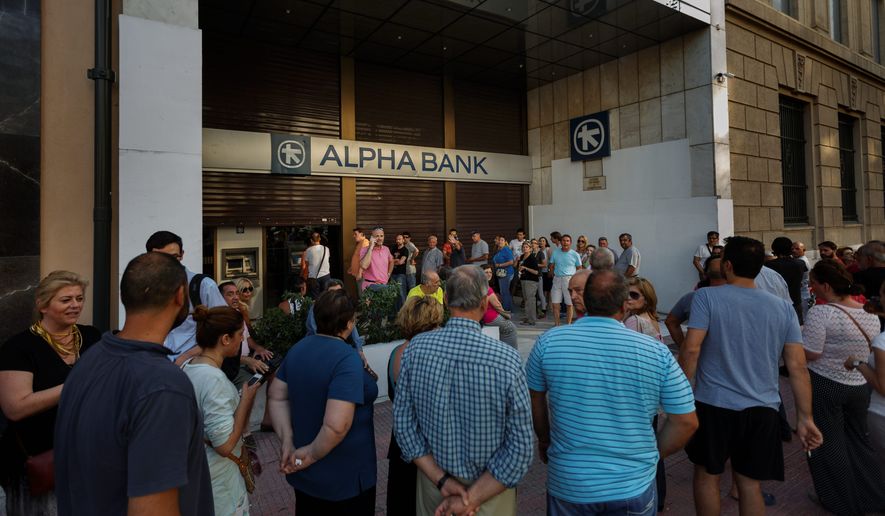After piling up the most debt in U.S. history and vowing to exceed spending caps in Congress this year, President Obama had few solutions to offer Monday as escalating debt emergencies in Greece and Puerto Rico roiled global financial markets.
Mr. Obama spoke by phone with French President Francois Hollande about the Greek crisis, expressing the hope that European leaders would devise a plan to allow Greece “to return to growth and debt sustainability within the eurozone,” said White House press secretary Josh Earnest.
“The United States has been strongly encouraging all parties to pursue this goal,” he said. Senior U.S. officials urged Europe and the International Monetary Fund to come up with a plan to hold the single currency together and keep Greece in the eurozone.
Talks between creditors and Greece broke down Sunday as the Greek prime minister insisted on putting proposed austerity measures to a July 5 referendum. The impasse resulted in the closing of all Greek banks Monday; cash machines will reopen Tuesday with a withdrawal limit of 60 euros, about $67.
In Puerto Rico, which faces default this week on $72 billion worth of municipal bonds, the White House said Monday that it won’t consider a bailout. Administration officials are advising leaders of the U.S. territory how to apply for “existing” federal aid.
Gov. Alejandro Garcia Padilla said Monday that the territory will be unable in the coming days to repay its debt. He said the government’s efforts to cut spending and restructure its debt have failed.
SEE ALSO: White House to Puerto Rico: No federal bailout
The twin debt emergencies caused most markets around the globe to plummet more than 2 percent in value Monday; U.S. stocks had their worst day of the year. It cast a dark cloud over Mr. Obama’s victory celebration at the White House as he signed trade legislation that he hopes will become the economic centerpiece of his second term.
Even as the markets were tanking, the president spoke of how he had “worked to rescue the economy from the worst financial crisis since the Great Depression,” and of how “401(k)s have been replenished.”
The president likes to point out that annual U.S. budget deficits have fallen by about two-thirds since he amassed trillion-dollar-plus deficits in his first term. But Mr. Obama doesn’t talk nearly as much about the federal government’s burgeoning debt problem.
The Congressional Budget Office predicts that the national debt will rise by more than half a trillion dollars for the next two years, leaving the U.S. with a $19.1 trillion debt by the time Mr. Obama leaves office. That would be nearly a doubling of the total debt under Mr. Obama, who came into office when the debt stood at $10.6 trillion.
Mr. Earnest said the president has been “very mindful” of reducing annual budget deficits and blamed Congress for the failure to address long-term debt.
“There’s no denying that there are some longer-term challenges over the horizon, and it will require the United States government at some point to act in bipartisan fashion to make some difficult decisions,” he said. “Unfortunately, we haven’t seen a lot of that spirit of bipartisanship as it relates to difficult decisions in Congress in great abundance.”
The president has issued veto threats against several spending bills in Congress as he proposes to increase spending by about 6 percent over the current fiscal year. Mr. Obama contends that the “sequestration” budget caps are no longer necessary since the economy has rebounded.
Republicans have proposed a budget that would balance over a decade by slashing some $5 trillion in spending, a plan that the administration has rejected as harsh and unfeasible.
In Greece, lines forming at gas stations and in front of the shrinking number of bank machines that still contained cash highlighted the scale of the disaster facing Greeks, who have endured more than six years of economic decline.
“The more calmly we deal with difficulties, the sooner we can overcome them and the milder their consequences will be,” a somber-looking Prime Minister Alexis Tsipras said in a televised address Sunday night. He promised bank deposits would be safe and salaries paid.
The euro fell sharply against the dollar, and safe-haven U.S. government debt futures rallied as investors exhibited fears of a Greek default and exit from the eurozone.
“That is going to have a real big impact on markets, and that will generate increased volatility,” said Ian Stannard, European head of FX strategy at Morgan Stanley in London.
As for Puerto Rico, Mr. Earnest said the administration has urged Congress to approve a Chapter 9 bankruptcy “mechanism” for Puerto Rico, which would allow the island’s public corporations to declare bankruptcy. As a commonwealth, Puerto Rico is not allowed to use Chapter 9 of federal bankruptcy law.
He said the administration also has been using an interagency task force to work with officials in Puerto Rico “to help them understand exactly what kinds of federal programs they would qualify for based on existing resources.” A similar task force was deployed to help the city of Detroit handle its bankruptcy.
• This article is based in part on wire service reports.
• Dave Boyer can be reached at dboyer@washingtontimes.com.




Please read our comment policy before commenting.